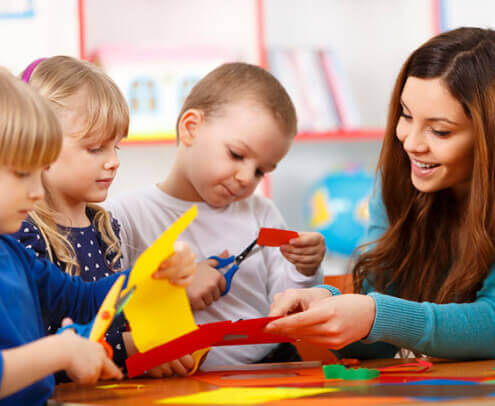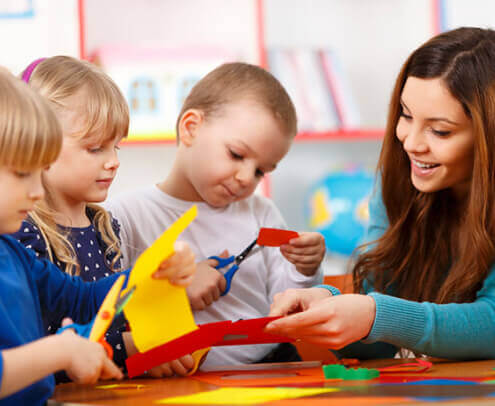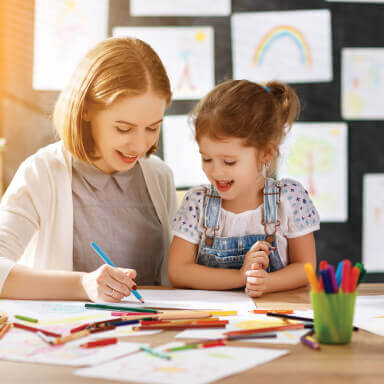We are dedicated to the care and education
Our Developmental Therapies
We provide developmental therapies to children with Autism Spectrum disorders (ASD), Sensory processing disorders (SPD), Attention Deficit Hyperactivity Disorders (ADHD), Cerebral Palsy (CP), Down syndrome, Erb’s palsy, Development delay, Dyslexia and other neuro-development disorders.
-








Occupational Therapy
How Might Occupational Therapy Help?
Occupational Therapy can help your child:
- Improve balance, coordination, strength, and/or motor planning skills
- Develop fine motor skills and/or handwriting skills
- Address hand-use, grasping patterns, eye-hand coordination, and manual dexterity
- Learn daily living skills
- Use specialized equipment
- Develop visual motor and visual processing skills
- Improve sensory processing, attention, and concentration
- Develop higher executive function skills
-








Physio Therapy
Improving Gross Motor Development
Recommendations may be made for your child to receive physical therapy or a physical therapy evaluation because of concerns regarding their overall gross motor development, delayed motor milestones, or functional limitations.
Many children who demonstrate delays in balance, coordination, gait deviations, motor & postural control, torticollis, or have overall decreased strength & endurance may benefit from direct physical therapy services.
The Physical Therapy Process
At rugratscocoon, a pediatric physical therapist can evaluate your child to determine if they qualify for physical therapy. Following the evaluation, therapy can begin to address your child’s specific needs.
-








Sensory Integration Therapy
Sensory integration therapy is advised by a professional after a qualified occupational therapist completes his or her assessment of a child. Therapy is usually advised early in a child’s development – sensory deficits should be dealt with in infancy of possible to give children the advantage of learning to adjust and compensate for his or her condition as he or she develops.
Addressing sensory deficits early improves:
- Capacity to learn
- Cognitive function
- Emotional well-being
- Physical function
- Propensity to make friends and to socialize
-








Neuro Developmental Therapy
Neuro Developmental Therapy offers dedicated sensory integration therapy, a non-invasive curative program which is intended to bring agility or freeness of movement in children suffering from cerebral palsy, Autism Spectrum Disorder or ASD, ADHD and other such syndromes.
We help the nervous system retain normalcy by eliminating inhibitions restricting primitive reflexes in children.
-








Speech, Language & Communication Therapy
Speech Therapy encompasses evaluations and treatment in the areas of articulation, language, fluency, social communication, and cognitive-communication across the lifespan.
● Articulation- Articulation is difficulty with the production of sound involving the coordinated movements of the lips, tongue, teeth, palate, and respiratory system.
● Language- Language disorders are characterized as expressive or receptive. Expressive language disorder is the difficulty for one to get their meaning or messages across to other people. Receptive language disorders are when one struggles to understand and process the messages and information they receive from others.
● Fluency- Fluency(stuttering) is the repetition or prolongation of sounds, syllables, words, or phrases.
● Social communication- Social communication (pragmatics) is the use of language in functional and socially appropriate ways and difficulty with the social use of verbal and nonverbal communication.
● Cognitive Communication- Cognitive communication is difficulty organizing thoughts, paying attention, remembering, planning, and/or problem-solving. -










Special Education
Special Education therapy is not the same as tutoring. Unlike traditional tutors, special education therapists are not only focused on academics but also on their behaviour issues. These therapists may have experience working with kids with learning and thinking differences.
They help build your child’s learning, Reading, and speaking skills and also improve his development disorder. If your child is struggling in learning academics, get in touch with Blooming Words. We have a team of experienced and talented education therapists who teach skills and strategies that help kids manage their academic learning issues. They can help kids with almost any learning or thinking differently.
-










Oral Placement Therapy
Oral Placement Therapy (OPT) is a type of speech therapy which applies a combination of auditory, visual and tactile stimulation to the mouth to improve speech sound production and clarity. It is an integrated approach which evaluates sensory, feeding, oral placement and speech functioning. OPT mimics speech movement – all exercises are given with the intent of transitioning into functional speech goals.
OPT is used to improve oral awareness, placement, stability and muscle memory – all of which are necessary for the production of speech sounds and clear articulation of speech. In particular, there is a focus on the correct oral placement of the jaw, tongue and lips to accomplish optimal oral placement needed for each sound, as well as strength in the abdomen for extended and controlled airflow for longer speech.
-








Early Intervention Services
Children grow and develop at their own rate. Although some children walk and talk early, others may be delayed in learning certain skills. If you have any concerns about your child’s development, the earlier you seek help, the better.
Early intervention is for children ages birth to 3 and their families. Early intervention is available in every state under federal law. In some states, early intervention programs may continue until a child is age 5.
Families and professionals, including audiologists and speech-language pathologists, are part of an early intervention team. They help children develop skills such as
- cognitive skills (thinking, learning, problem-solving);
- communication skills (gesturing, talking, listening, understanding);
- physical and sensory skills (crawling, walking, climbing, seeing, hearing);
- social–emotional skills (playing, understanding feelings, making friends); and
- adaptive or self-help skills (eating, bathing, dressing).
Early intervention is different for each child and family depending on the child’s needs and the family’s priorities. The most important step is to start early.
-






Floor Time Therapy
Floortime play therapy helps children with autism build emotional connections and communication skills. Floortime is structured play therapy which can be administered by professionals, parents, guardians, or para-professionals in a huge range of settings.
Unlike behavioral therapies, Floortime is focused on helping children and teens to make emotional connections. Floortime is a low-risk, low-cost way to expand a child’s emotional and social skills. You can build a stronger parent or guardian-child bond while having fun.
-








Group Therapy
Group therapy is a unique experience and opportunity for individuals to grow and connect with others who share similar life experiences, challenges, fears, barriers, and more can often feel isolating. While individual therapy is a fantastic resource for children facing mental and behavioral health challenges, there is something to be said about how children learn from one another. As kids, we spend a large amount of time learning from our peers and using them as a resource for our growth and development. From learning how to speak and socialize to learning how to be a good friend and support those we care about, the lessons we learn from people we share experiences with are precious.
Growing and adapting in those situations can be challenging for children who have unique experiences like anxiety, mood disorders, intense emotions, trauma, or sudden life changes. Things like this are hard for people of all ages. Lessons like how to seek out support, effectively express one’s feelings, and how to communicate effectively are not inherent, meaning they must be learned. These challenges are even more difficult for children who have yet to have the experiences that equip them with tools to face mental health challenges.







 Baby Milestone (100 KB)
Baby Milestone (100 KB)  download
download Child Care Checklist (95 KB)
Child Care Checklist (95 KB)  Agreement Form (94 KB)
Agreement Form (94 KB)  404, Sankalp Square, 2, kalgi cross road, near chirag motor cross road, opp. Jalaram Mandir (Temple), Ellisbridge, Ahmedabad, Gujarat 380006
404, Sankalp Square, 2, kalgi cross road, near chirag motor cross road, opp. Jalaram Mandir (Temple), Ellisbridge, Ahmedabad, Gujarat 380006 +91 9998887586
+91 9998887586 mihika2843@gmail.com
mihika2843@gmail.com